Intifada is an Arabic word for a rebellion or uprising, or a resistance movement. It can be used to refer to an uprising against oppression.

Western Sahara is a disputed territory in North-western Africa. It has a surface area of 272,000 square kilometres (105,000 sq mi). Approximately 30% of the territory is controlled by the Sahrawi Arab Democratic Republic (SADR); the remaining 70% is occupied and administered by neighboring Morocco. It is the most sparsely populated country in Africa and the second most sparsely populated country in the world, mainly consisting of desert flatlands. The population is estimated at 618,600. Nearly 40% of that population lives in Morocco-controlled Laayoune, the largest city of Western Sahara.
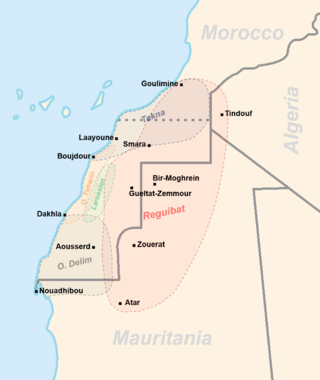
The Sahrawis, or Sahrawi people, are an ethnic group native to the western part of the Sahara desert, which includes the Western Sahara, southern Morocco, much of Mauritania, and along the southwestern border of Algeria. They are of mixed Hassani Arab and Sanhaji Berber descent, as well as West African and other indigenous populations.

The Western Sahara has an established music tradition. Many of the well-known from the country musicians have settled in Dakar, where they mingled further with musicians from West Africa.

Sahrauis: The Music of the Western Sahara is a three-disc box set of Saharawi music, published by the Spanish label Nubenegra. It was the first compilation of such songs released in the United States. The producers of the album travelled to the Sahrawi refugee camps and spent 14 days with the artists to record the CDs 1 & 2 of the compilation, with the aim of recording with the finest musicians and singers the traditional Sahrawi music (Haul) of the past and present.
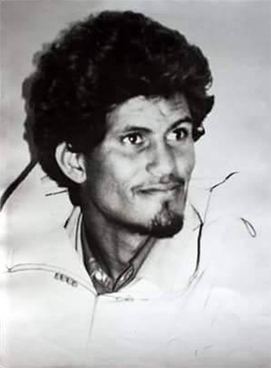
El-Ouali Mustapha Sayed was a Sahrawi nationalist leader, co-founder and second Secretary-General of the Polisario Front.
The Independence Intifada or the Second Sahrawi Intifada and also May Intifada is a Sahrawi activist term for a series of disturbances, demonstrations and riots that broke out in May 2005 in the Moroccan-controlled parts of Western Sahara and south of Morocco. This event has also been called The El-Aaiun Intifada by the same sources.
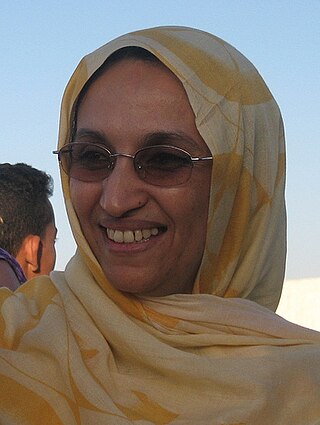
Aminatou Ali Ahmed Haidar, sometimes known as Aminetou, Aminatu or Aminetu, is a Sahrawi human rights activist and an advocate of the independence of Western Sahara. She is often called the "Sahrawi Gandhi" or "Sahrawi Pasionaria" for her nonviolent protests. She is the president of the Collective of Sahrawi Human Rights Defenders (CODESA). She was imprisoned from 1987 to 1991 and from 2005 to 2006 on charges related to her independence advocacy. In 2009, she attracted international attention when she staged a hunger strike in Lanzarote Airport after being denied re-entry into Moroccan Western Sahara. Haidar has won several international human rights awards for her work, including the 2008 Robert F. Kennedy Human Rights Award, 2009 Civil Courage Prize and 2019 Right Livelihood Award.

The Government of Morocco sees Western Sahara as its Southern Provinces. The Moroccan government considers the Polisario Front as a separatist movement given the alleged Moroccan origins of some of its leaders.
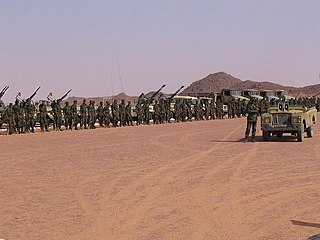
The Western Sahara conflict is an ongoing conflict between the Sahrawi Arab Democratic Republic/Polisario Front and the Kingdom of Morocco. The conflict originated from an insurgency by the Polisario Front against Spanish colonial forces from 1973 to 1975 and the subsequent Western Sahara War against Morocco between 1975 and 1991. Today the conflict is dominated by unarmed civil campaigns of the Polisario Front and their self-proclaimed SADR state to gain fully recognized independence for Western Sahara.

Mariem Hassan was a Sahrawi singer and lyricist. She usually sang in Hassaniya, an Arabic variant spoken mostly in Western Sahara and Mauritania, occassionaly singing in Saharan Spanish.
Najm Allal is a singer, guitarist and writer of lyrics in Spanish from Western Sahara.

Aziza Brahim is a Sahrawi singer and actress.

The Gdeim Izik protest camp was a protest camp in Western Sahara, established on 9 October 2010 and lasting into November that year, with related incidents occurring in the aftermath of its dismantlement on 8 November. The primary focus of the protests was against "ongoing discrimination, poverty and human rights abuses against local citizens".

Mariem Hassan, la voz del Sáhara is a 2007 documentary film directed by Manuel Domínguez.

The Western Sahara national football team represents Western Sahara (SADR), a disputed territory, in association football. Controlled by the Sahrawi Football Federation, they are members of World Unity Football Alliance for non-FIFA-affiliated nations.

Shouka is the second album of Sahrawi singer Mariem Hassan. It was recorded again at Axis studios, in Madrid, and produced by Manuel Domínguez, who is also the boss of the label Nubenegra. The album reached Number 1 on the World Music Charts Europe (WMCE) in March 2010. "Shouka", the central song that titles the album, is a new experience in the Sahrawi music, as it is structured as a cantata. Taking the verses of Sahrawi poet Lamine Allal, Hassan developed a nine paragraph critical response to the 1976 speech of then Spanish opposition leader and later president of Spain Felipe González at the Sahrawi refugee camps, by using all scales and rhythms of the Haul. In this work, Mariem's group is completed with Lamgaifri Brahim and Vadiya Mint El Hanevi. Several other musicians contributed to the album, as Senegalese Malick Diaw (guitar), Spanish Kepa Osés (bass), Hugo Westerdahl (bass), Josemi Sánchez (guitar) and Jaime Muñoz (flutes), Iranian Behnam Samani and Davood Varzideh (ney), and Cuban-Haitian Mel Seme (percussionist).

Brahim Ghali is a Sahrawi politician, military officer and current president of the Sahrawi Arab Democratic Republic (SADR), formerly its ambassador to Algeria and Spain.
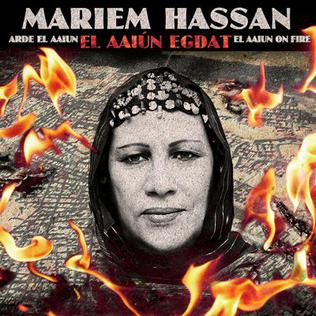
El Aaiun egdat is the third album of Sahrawi singer Mariem Hassan. The album reached Number 1 on the World Music Charts Europe (WMCE) on June and July 2012. It was also elected as the best album presented at the 2012 edition of the World Village Festival in Helsinki, Finland.
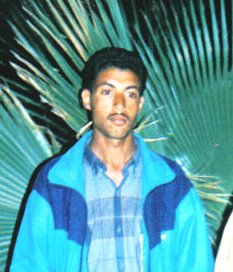
Hamdi Lembarki was a Sahrawi activist who was killed by Moroccan police after a demonstration in El Aaiun, during the Second Sahrawi Intifada in 2005.

















